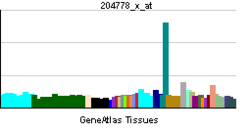HOXB8
| Homeobox B8 | |||
|---|---|---|---|
| Identifiers | |||
| Symbols | HOXB8 ; HOX2; HOX2D; Hox-2.4 | ||
| External IDs | OMIM: 142963 MGI: 96189 HomoloGene: 7768 GeneCards: HOXB8 Gene | ||
| RNA expression pattern | |||
 | |||
 | |||
| More reference expression data | |||
| Orthologs | |||
| Species | Human | Mouse | |
| Entrez | 3218 | 15416 | |
| Ensembl | ENSG00000120068 | ENSMUSG00000056648 | |
| UniProt | P17481 | P09632 | |
| RefSeq (mRNA) | NM_024016 | NM_010461 | |
| RefSeq (protein) | NP_076921 | NP_034591 | |
| Location (UCSC) | Chr 17: 46.69 – 46.69 Mb | Chr 11: 96.28 – 96.29 Mb | |
| PubMed search | |||
Homeobox protein Hox-B8 is a protein that in humans is encoded by the HOXB8 gene.[1][2][3]
This gene is a member of the Antp homeobox family and encodes a nuclear protein with a homeobox DNA-binding domain. It is included in a cluster of Homeobox B genes located on chromosome 17. The encoded protein functions as a sequence-specific transcription factor that is involved in development. Increased expression of this gene is associated with colorectal cancer. Mice that have had the murine ortholog (see Homology (biology) § Orthology) of this gene knocked out exhibit an excessive pathologic grooming behavior. This behavior is similar to the behavior of humans suffering from the obsessive-compulsive spectrum disorder trichotillomania.[3]
Transplantation of normal (wild-type) bone marrow into a Hoxb8 mutant mouse results is a reduction of compulsive grooming.[4]
See also
References
- ↑ McAlpine PJ, Shows TB (Aug 1990). "Nomenclature for human homeobox genes". Genomics 7 (3): 460. doi:10.1016/0888-7543(90)90186-X. PMID 1973146.
- ↑ Scott MP (Dec 1992). "Vertebrate homeobox gene nomenclature". Cell 71 (4): 551–3. doi:10.1016/0092-8674(92)90588-4. PMID 1358459.
- ↑ 3.0 3.1 "Entrez Gene: HOXB8 homeobox B8".
- ↑ Shau-Kwaun Chen, Petr Tvrdik, Erik Peden, Scott Cho, Sen Wu1, Gerald Spangrude and Mario R. Capecchi (May 2010). "Hematopoietic Origin of Pathological Grooming in Hoxb8 Mutant Mice". Cell 141 (5): 775–785. doi:10.1016/j.cell.2010.03.055. PMC 2894573. PMID 20510925.
Further reading
- Peverali FA, D'Esposito M, Acampora D et al. (1991). "Expression of HOX homeogenes in human neuroblastoma cell culture lines.". Differentiation 45 (1): 61–9. doi:10.1111/j.1432-0436.1990.tb00458.x. PMID 1981366.
- Giampaolo A, Acampora D, Zappavigna V et al. (1989). "Differential expression of human HOX-2 genes along the anterior-posterior axis in embryonic central nervous system.". Differentiation 40 (3): 191–7. doi:10.1111/j.1432-0436.1989.tb00598.x. PMID 2570724.
- Acampora D, D'Esposito M, Faiella A et al. (1990). "The human HOX gene family.". Nucleic Acids Res. 17 (24): 10385–402. doi:10.1093/nar/17.24.10385. PMC 335308. PMID 2574852.
- Boncinelli E, Acampora D, Pannese M et al. (1990). "Organization of human class I homeobox genes.". Genome 31 (2): 745–56. doi:10.1139/g89-133. PMID 2576652.
- Apiou F, Flagiello D, Cillo C et al. (1996). "Fine mapping of human HOX gene clusters.". Cytogenet. Cell Genet. 73 (1–2): 114–5. doi:10.1159/000134320. PMID 8646877.
- Vider BZ, Zimber A, Hirsch D et al. (1997). "Human colorectal carcinogenesis is associated with deregulation of homeobox gene expression". Biochem. Biophys. Res. Commun. 232 (3): 742–8. doi:10.1006/bbrc.1997.6364. PMID 9126347.
- Dias Neto E, Correa RG, Verjovski-Almeida S et al. (2000). "Shotgun sequencing of the human transcriptome with ORF expressed sequence tags". Proc. Natl. Acad. Sci. U.S.A. 97 (7): 3491–6. doi:10.1073/pnas.97.7.3491. PMC 16267. PMID 10737800.
- Fujino T, Yamazaki Y, Largaespada DA et al. (2001). "Inhibition of myeloid differentiation by Hoxa9, Hoxb8, and Meis homeobox genes". Exp. Hematol. 29 (7): 856–63. doi:10.1016/S0301-472X(01)00655-5. PMID 11438208.
- Knoepfler PS, Sykes DB, Pasillas M, Kamps MP (2001). "HoxB8 requires its Pbx-interaction motif to block differentiation of primary myeloid progenitors and of most cell line models of myeloid differentiation". Oncogene 20 (39): 5440–8. doi:10.1038/sj.onc.1204710. PMID 11571641.
- Greer JM, Capecchi MR (2002). "Hoxb8 is required for normal grooming behavior in mice". Neuron 33 (1): 23–34. doi:10.1016/S0896-6273(01)00564-5. PMID 11779477.
- Kosaki K, Kosaki R, Suzuki T et al. (2002). "Complete mutation analysis panel of the 39 human HOX genes". Teratology 65 (2): 50–62. doi:10.1002/tera.10009. PMID 11857506.
- Ota T, Suzuki Y, Nishikawa T et al. (2004). "Complete sequencing and characterization of 21,243 full-length human cDNAs". Nat. Genet. 36 (1): 40–5. doi:10.1038/ng1285. PMID 14702039.
External links
- HOXB8 protein, human at the US National Library of Medicine Medical Subject Headings (MeSH)
This article incorporates text from the United States National Library of Medicine, which is in the public domain.
| ||||||||||||||||||||||||||||||||||||||||||||||||||||||||||||||||||||||||||||||||||||||||||||||||||||||||||||||||||||||||||||||||||||||||||||||||||||||||||||||||||||||||||||||||||||||||||||||||||||||||||||||